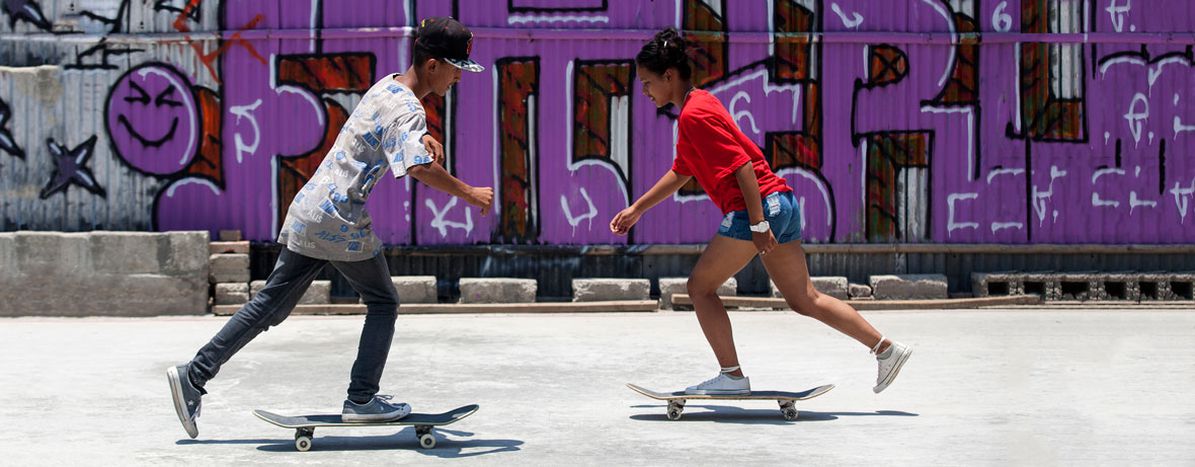
SKATE Nepal: Rolling over gender inequality
Published on
Bibbi Abruzzini and Zyanya Jackson worked together with Refurb Skate in Nepal to document how skateboarding has the potential to empower young women and children. Through searing heat and torrential rain, what emerged was a community of stoked boarders - girls and boys alike. All it took for these two young Europeans to find magic were two essential weapons: a camera and a skateboard.
Cafébabel: Could you tell us a little bit more about yourselves
Bibbi Abruzzini: I grew up in Italy until I was nine years old, then I moved to Brussels. That was my first cultural shock. Uprooted is the word that best describes those first weeks in Belgium. Growing up in the ‘heart of Europe’ motivated me to travel the world and find an identity beyond national borders. As a child… my dream was to become a journalist. I used to cut pictures from National Geographic and rewrite articles on my own ‘research papers’. In 2010 I started working as a journalist and have been working as a correspondent from Nepal, Colombia and the US since then.
Zyanya Jackson: I’m originally from the South coast of England, but after university I started travelling and doing winter seasons. I went from snowboarding in Europe to New Zealand, specifically Queenstown, where I’ve been living on and off for the past three years - and where Refurb Skate started!
Cafébabel: How did you get involved with Refurb Skate?
Bibbi Abruzzini: I was at a music festival in the Sindhupalchowk district in Nepal, covering the situation in the region two years after the earthquake hit, which killed nearly 9,000 people and left 3.5 million homeless. There, I had the chance of meeting Jean-Marc, my tent neighbour and an energetic Parisian, who had been building skate parks all around the world with Make Life Skate Life. He explained that they were almost done with the construction of the Annapurna skate park, a community skate park in Nepal’s second largest city – Pokhara – seeking to accommodate the growing demand for safe space for skateboarding. On their Facebook page I found out that Refurb Skate was going to host a three week skateboard workshop to make the sport more accessible and less intimidating to girls and children. That’s when I knew I wanted to make a documentary about them.
Zyanya Jackson: Last October a friend told me that they were looking for a few girls to be guinea pigs for a trial skate program at SITE Trampoline (an indoor training facility). They wanted to see how far they could get a group of girls, who only had a small amount of skating experience, to progress in six weeks. Our coach Jens Groot pushed us to learn something new every week. At the end of it, we were so stoked with how far we had come… that we started running the Girls Skate Night every week at SITE. Refurb started out as a nickname for the handful of us at that first trial program, and through Girls Skate Night we got over 40 girls (ages 5-35) involved in something they would otherwise have thought too intimidating. It’s important to us that the guys involved with Refurb Skate get the recognition they deserve. Duncan Philp is an awesome skater and played a huge part in our trip to Nepal. Despite Refurb mainly being a female skate community, Duncan and Jens have been a part of it since day one.
Cafébabel: Why skating, what is your relationship with this sport?
Bibbi Abruzzini: I always thought there was something fascinating about skating. That’s until I started skating in Paris and almost broke my ribs. My uncle who would cruise around Rome with his long-board, read The Hobbit out loud and listen to Guns N’ Roses first introduced me to the sport. I’ve always appreciated the community aspect of this sport and the fact that it was accessible to most people.
As a woman, I am also interested in exploring the relationship between skating and femininity. I think that many sports are gendered. Growing up I defined myself as a tom boy for playing basketball, but after a while I was like: “You know what? I can play basketball, dress like Allen Iverson but still be a woman, or whoever I decide to be.” It was interesting for me having lived in Nepal for over five years to explore how this sport was perceived by society, and how the girls practicing it viewed themselves.
Zyanya Jackson: I’m not sure why to be honest. I had a skateboard as a kid but never had any friends who skate, so I didn’t get into it until I moved to Queenstown. I love it now because even though it’s an individual thing, I’ve made so many friends through it. I’ve come to realise that even if you turn up to skate somewhere by yourself, people generally have a really positive attitude towards each other, no matter how good or bad you are! It feels pretty good to be part of a community like that.
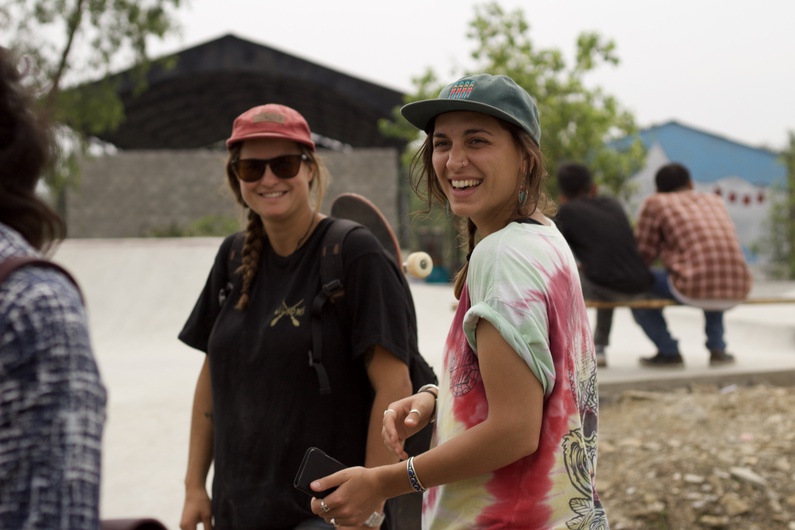 Cafébabel: How do you think the project/documentary reflects our generation?
Cafébabel: How do you think the project/documentary reflects our generation?
Bibbi Abruzzini: It shows that we are not afraid of trying, and brings with it unconditional positivity because it connects people from different cultures and gives everybody a space to express them. We are a generation that believes in themselves. We want to believe that everything is possible; everything is permitted. The youth from all over the world, from Nepal to the US, is breaking boundaries and pushing for a new ‘normal’. We want to trigger change, travel and understand a world that is increasingly accessible to us. We move at an incredible speed and we haven’t reached our potential yet, but we are the future… in our own way.
Zyanya Jackson: The most obvious thing for me is that in the last few years, especially with the growth of social media, we see more and more girls skating. It’s not just pro athletes in competitions. You can go on Instagram or Facebook and find a 100 different accounts documenting girls skate days, local competitions or just friends posting clips of each other having fun. Things like this go a long way in changing attitudes from previous generations that might otherwise have held negative images associated with skating. It gives girls a presence [in a field] that guys have dominated for a long time. To be honest, we’re stoked that Refurb Skate is a part of that change.
Cafébabel: What were some of the biggest challenges you faced when making the S.K.A.T.E documentary?
Bibbi Abruzzini: I wanted to make a documentary that allowed people, regardless of their nationality, to relate to it. Not everybody is interested in skateboarding, so the objective was to tell a larger story. Having lived in Nepal for five years, I wanted to portray the country as a place where change is occurring. I didn’t want to promote the stereotypical ‘poor Himalayan nation’ narrative.
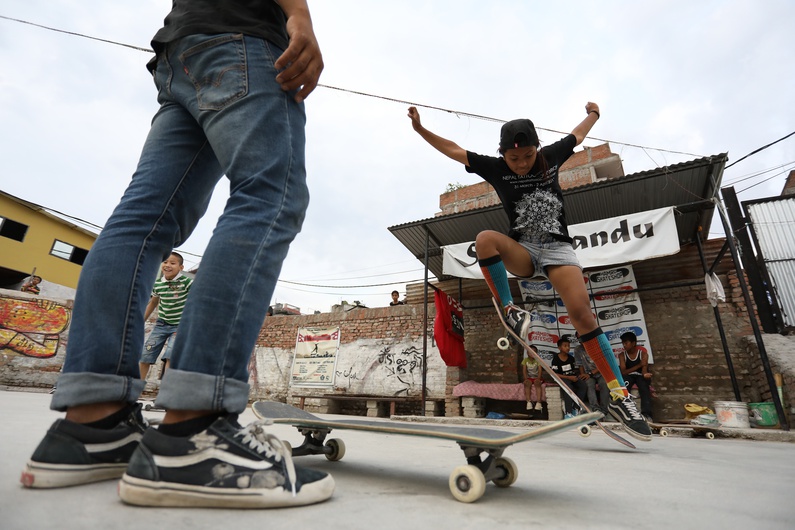 Making an independent documentary is never easy as you have little resources, and you have to juggle your time between your ‘real job’ and your project. Sometimes I felt too tired to film or carry 10 kilos of equipment, or I was simply deeply uninspired. I didn’t know how the project would end up; it kind of took on a life of its own.
Making an independent documentary is never easy as you have little resources, and you have to juggle your time between your ‘real job’ and your project. Sometimes I felt too tired to film or carry 10 kilos of equipment, or I was simply deeply uninspired. I didn’t know how the project would end up; it kind of took on a life of its own.
Zyanya Jackson: The whole trip was a massive learning curve for us. The language barrier was obviously one of the biggest challenges we faced, but also running the program in Pokhara was nothing like running it in Queenstown. Back home we were lucky to have an established community, effective means of communication and lots of equipment available. Here we were starting from scratch.
Understanding Nepalese culture and figuring out how to work around the incredible amount of commitments these people have took some time, but luckily an extended public holiday fell right in the middle of our time there, so a lot of kids were free to come to the skate park every day. In talking to the girls we met in Nepal, we found out that people still hold a very stereotypical view of gender roles. In the documentary, you hear Rezina’s mum talking about how her neighbours disapproved of her allowing her daughter to skate and dress the way she wanted, and about how it’s still the women spend all their time cooking and cleaning. We were so lucky to meet girls like Rezina in Kathmandu and Thombay and Archana in Pokhara who are challenging these stereotypes, and who have the support of their families to do what they love.
Then there was trying to avoid the midday heat and the torrential rain every afternoon! We were at the skate park by 7 in the morning every day and didn’t normally leave until dark.
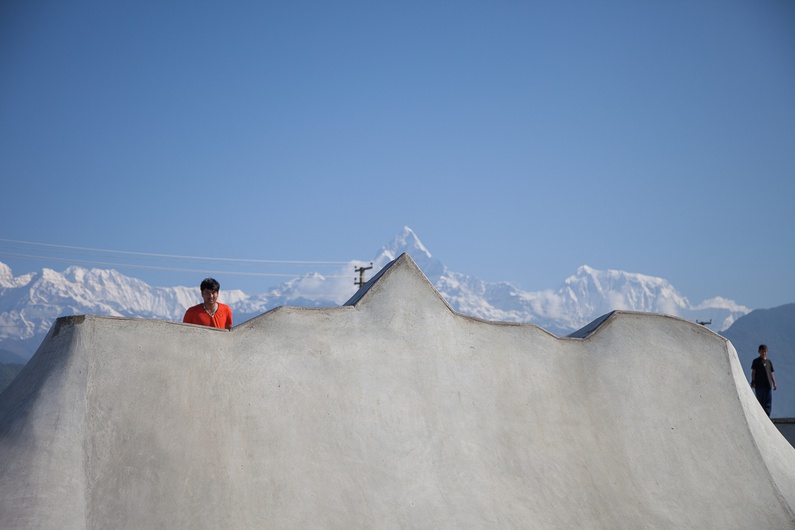 Cafébabel: What are you most proud of?
Cafébabel: What are you most proud of?
Bibbi Abruzzini: I felt really fortunate to tell this story and learn things along the way. I crossed paths with people from all backgrounds and ages, and every single one of them left a little something in me. The Refurb Skate team created such powerful connections with the girls at the skate parks in Kathmandu and Pokhara that it was an honor to witness all the friendship and love. I was [also] glad that I could go in the field with some local photojournalists who are increasingly noticing how the local skate scene is blossoming. One of them in particular, Sanjog Manandhar did an amazing job in covering skating in Kathmandu and showing how it challenges society’s expectations.
I hope that this documentary will encourage people in Nepal and elsewhere to continue telling their own amazing stories.
Zyanya Jackson: Seeing the boys at the Annapurna skate park in Pokhara start to help the girls to learn how to skate. They went from completely ignoring them or taking away their skateboards to giving them first go, and actually encouraging them… giving them their own space to progress. I think seeing Duncan set that example was really important for the boys there. It was cool to see their little community forming by the end, with the girls and the boys sharing the skate park together.
Cafébabel: Can you imagine a project like this taking place in Europe? If so, how would it be different/the same?
Bibbi Abruzzini: Yes, [but] it would probably be different because skateboarding in Europe is more mainstream. Right now is a great time for women in the action sports industry. Participation is growing exponentially, even though it remains a male-dominated environment. What was interesting about the project in Nepal is that, similarly to what happened in other countries in South Asia such as Afghanistan, skateboarding could be seen as the ultimate empowerment loophole. In a region where women are strongly discouraged from playing sports, suddenly parents or grandparents find themselves watching their kids skate, which is something they could have never imagined before Refurb Skate introduced the sport.
Zyanya Jackson: I think a project like this would be really popular in Europe. The cultural similarities would make it easier, and it’s easier to find a common language. There’s already so many girls skating over there, so it would just be a case of getting everyone together and getting sponsors involved to help with funding a project rather than just a one-off event. Europeans are lucky that there’s a lot more business around skating to draw on. For us, it definitely took a few sessions before we could really see ourselves making significant progress. Skating is not something that comes overnight, you have to keep working at it, and it was great to have that month in Nepal to get everyone on a skateboard and teach them the basics… but think about how epic it would be if there was a permanent program set up there to keep those girls stoked.
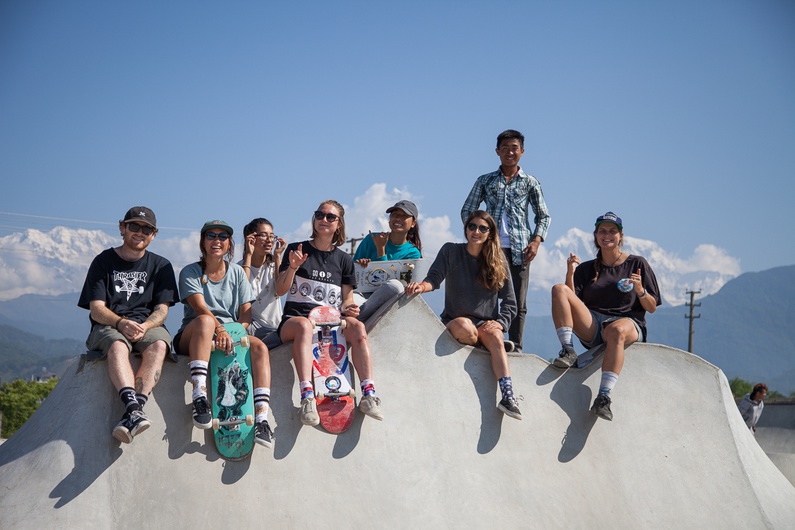 Cafébabel: How do you see skateboarding empowering young women and children in Europe?
Cafébabel: How do you see skateboarding empowering young women and children in Europe?
Bibbi Abruzzini: Anybody can benefit from sports and from challenging themselves through skateboarding. It’s a sport that still has some stigma attached to it. But now that skateboarding is becoming an integrated part of communities and public spaces, I think that people are going to be more open to trying it out.
Zyanya Jackson: This sport has the power to bring skill and confidence to young women and children. Even though it’s based on physical ability, there is also a huge culture behind skateboarding largely linked to art and music, bringing with it a lot of open-minded individuals always looking to challenge the status quo. Whether that’s through their physical ability or through a combination of their art and skateboarding, it allows people to express themselves creatively and understand how their bodies move, fall, how to contend with fear, etc.
Cafébabel: If you could wish one thing for a better future, what would it be?
Bibbi Abruzzini: People sharing more knowledge and emotions.
Zyanya Jackson: More skate parks. And definitely more equality.
---



